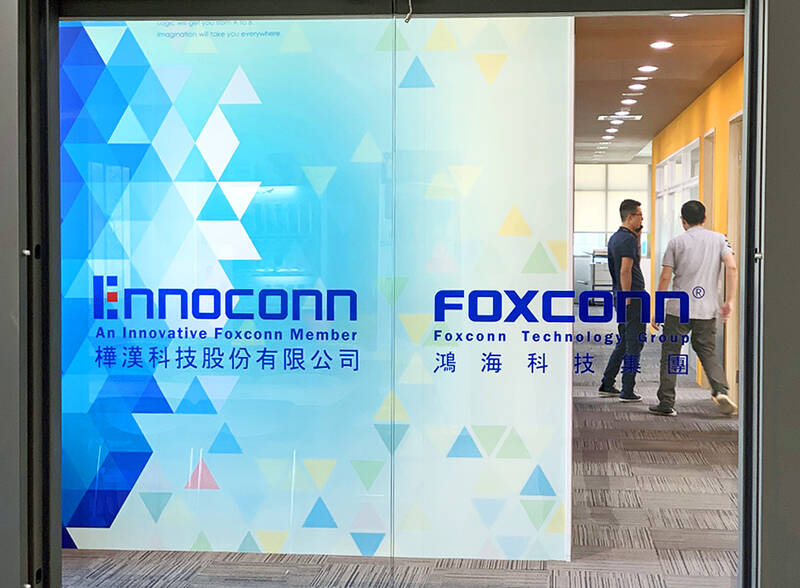Industrial computer maker Ennoconn Corp (樺漢科技) on Wednesday said it is to acquire a major stake in Singapore-based Nera Telecommunications Ltd as it aims to strengthen its “Ennoconn Solution as a Service (ESaaS)” platform and expand its overseas presence.
Ennoconn — which provides hardware solutions for point-of-sale (POS) banking automation, kiosk, lottery and industrial automation systems — plans to acquire 193.17 million shares in Nera Telecommunications at S$0.075 per share from the Singaporean firm’s major shareholder, Asia Systems Ltd, the Taipei-based company said in a statement.
The 193.17 million shares held by Asia Systems represent a 53.38 percent stake in Nera Telecommunications, which was established in 1978 and has market presence in 16 countries across the Asia-Pacific region, Europe, the Middle East and Africa.

Photo: CNA
Ennoconn said it expects to complete the share purchase before the end of next month.
The company would maintain Nera Telecommunications’ listing on the Singapore Exchange and has no intentions to participate in its operations, it added.
The total value of the deal amounts to S$14.49 million (US$11.1 million), which would have no impact on its financial status, Ennoconn said.
Ennoconn posted earnings per share of NT$8.36 in the first half of the year, compared with NT$9.79 in the same period last year.
The company said that as it is enhancing its strategy for the ESaaS platform, which focuses on digital transformation, artificial intelligence, energy management and information security solutions for enterprises, the deal would help it strengthen its competitiveness and fortify its presence in Southeast Asian markets, including Singapore, Vietnam, Thailand and Malaysia.
The deal comes after Ennoconn on Aug. 6 announced that it was forming a partnership with NCR Voyix Corp, a New York-listed manufacturer of POS, ATM and barcode readers.

NEW IDENTITY: Known for its software, India has expanded into hardware, with its semiconductor industry growing from US$38bn in 2023 to US$45bn to US$50bn India on Saturday inaugurated its first semiconductor assembly and test facility, a milestone in the government’s push to reduce dependence on foreign chipmakers and stake a claim in a sector dominated by China. Indian Prime Minister Narendra Modi opened US firm Micron Technology Inc’s semiconductor assembly, test and packaging unit in his home state of Gujarat, hailing the “dawn of a new era” for India’s technology ambitions. “When young Indians look back in the future, they will see this decade as the turning point in our tech future,” Modi told the event, which was broadcast on his YouTube channel. The plant would convert

‘SEISMIC SHIFT’: The researcher forecast there would be about 1.1 billion mobile shipments this year, down from 1.26 billion the prior year and erasing years of gains The global smartphone market is expected to contract 12.9 percent this year due to the unprecedented memorychip shortage, marking “a crisis like no other,” researcher International Data Corp (IDC) said. The new forecast, a dramatic revision down from earlier estimates, gives the latest accounting of the ongoing memory crunch that is affecting every corner of the electronics industry. The demand for advanced memory to power artificial intelligence (AI) tasks has drained global supply until well into next year and jeopardizes the business model of many smartphone makers. IDC forecast about 1.1 billion mobile shipments this year, down from 1.26 billion the prior

People stand in a Pokemon store in Tokyo on Thursday. One of the world highest-grossing franchises is celebrated its 30th anniversary yesterday.

Zimbabwe’s ban on raw lithium exports is forcing Chinese miners to rethink their strategy, speeding up plans to process the metal locally instead of shipping it to China’s vast rechargeable battery industry. The country is Africa’s largest lithium producer and has one of the world’s largest reserves, according to the US Geological Survey (USGS). Zimbabwe already banned the export of lithium ore in 2022 and last year announced it would halt exports of lithium concentrates from January next year. However, on Wednesday it imposed the ban with immediate effect, leaving unclear what the lithium mining sector would do in the